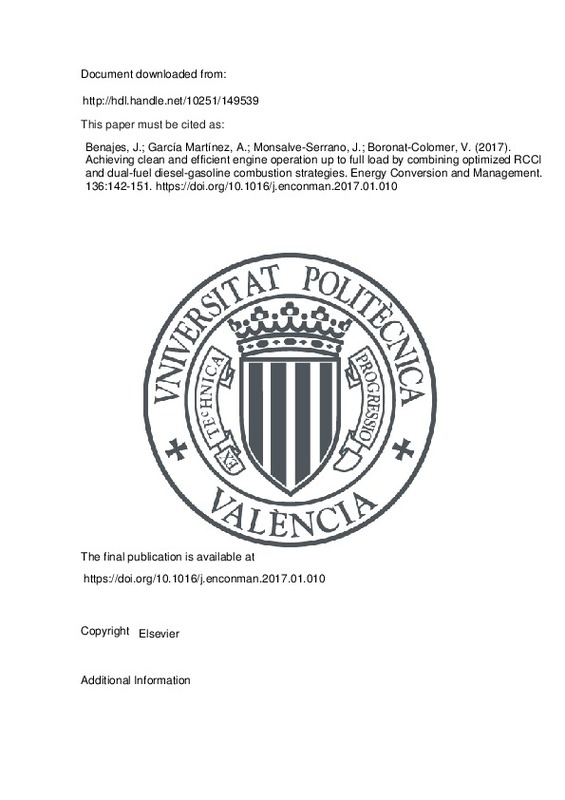JavaScript is disabled for your browser. Some features of this site may not work without it.
Buscar en RiuNet
Listar
Mi cuenta
Estadísticas
Ayuda RiuNet
Admin. UPV
Achieving clean and efficient engine operation up to full load by combining optimized RCCI and dual-fuel diesel-gasoline combustion strategies
Mostrar el registro sencillo del ítem
Ficheros en el ítem
| dc.contributor.author | Benajes, Jesús
|
es_ES |
| dc.contributor.author | García Martínez, Antonio
|
es_ES |
| dc.contributor.author | Monsalve-Serrano, Javier
|
es_ES |
| dc.contributor.author | Boronat-Colomer, Vicente
|
es_ES |
| dc.date.accessioned | 2020-09-08T03:31:57Z | |
| dc.date.available | 2020-09-08T03:31:57Z | |
| dc.date.issued | 2017-03-15 | es_ES |
| dc.identifier.issn | 0196-8904 | es_ES |
| dc.identifier.uri | http://hdl.handle.net/10251/149539 | |
| dc.description.abstract | [EN] This experimental work investigates the capabilities of the reactivity controlled compression ignition combustion concept to be operated in the whole engine map and discusses its benefits when compared to conventional diesel combustion. The experiments were conducted using a single-cylinder medium duty diesel engine fueled with regular gasoline and diesel fuels. The main modification on the stock engine architecture was the addition of a port fuel injector in the intake manifold. In addition, with the aim of extending the reactivity controlled compression ignition operating range towards higher loads, the piston bowl volume was increased to reduce the compression ratio of the engine from 17.5:1 (stock) down to 15.3:1. To allow the dual-fuel operation over the whole engine map without exceeding the mechanical limitations of the engine, an optimized dual-fuel combustion strategy is proposed in this research. The combustion strategy changes as the engine load increases, starting from a fully premixed reactivity controlled compression ignition combustion up to around 8 bar IMEP, then switching to a highly premixed reactivity controlled compression ignition combustion up to 15 bar IMEP, and finally moving to a mainly diffusive dual-fuel combustion to reach the full load operation. The engine mapping results obtained using this combustion strategy show that reactivity controlled compression ignition combustion allows fulfilling the EURO VI NOx limit up to 14 bar IMEP. Ultra-low soot emissions are also achieved when the fully premixed combustion is promoted, however, the soot levels rise notably as the combustion strategy moves to a less premixed pattern. Finally, the direct comparison of reactivity controlled compression ignition versus conventional diesel combustion using the nominal engine settings, reveals that reactivity controlled compression ignition can be a potential solution to reduce the selective catalyst reduction and diesel particulate filter aftertreatment necessities with a simultaneous improving of the thermal efficiency. (C) 2017 Elsevier Ltd. All rights reserved. | es_ES |
| dc.description.sponsorship | This investigation has been funded by VOLVO Group Trucks Technology. The authors also acknowledge the Spanish economy and competitiveness ministry for partially supporting this research (HiReCo TRA2014-58870-R). The predoctoral contract of the author J. Monsalve-Serrano (FPI-S2-2015-1531) is granted by the Programa de Apoyo para la Investigación y Desarrollo (PAID) of the Universitat Politècnica de València. | es_ES |
| dc.language | Inglés | es_ES |
| dc.publisher | Elsevier | es_ES |
| dc.relation.ispartof | Energy Conversion and Management | es_ES |
| dc.rights | Reconocimiento - No comercial - Sin obra derivada (by-nc-nd) | es_ES |
| dc.subject | Reactivity controlled compression ignition | es_ES |
| dc.subject | Dual-fuel combustion | es_ES |
| dc.subject | Engine map | es_ES |
| dc.subject | EURO VI emissions | es_ES |
| dc.subject | Efficiency | es_ES |
| dc.subject.classification | MAQUINAS Y MOTORES TERMICOS | es_ES |
| dc.title | Achieving clean and efficient engine operation up to full load by combining optimized RCCI and dual-fuel diesel-gasoline combustion strategies | es_ES |
| dc.type | Artículo | es_ES |
| dc.identifier.doi | 10.1016/j.enconman.2017.01.010 | es_ES |
| dc.relation.projectID | info:eu-repo/grantAgreement/MINECO//TRA2014-58870-R/ES/REDUCCION DE LAS EMISIONES DE CO2 EN VEHICULOS PARA TRANSPORTE USANDO COMBUSTION DUAL NATURAL GAS-DIESEL/ | es_ES |
| dc.relation.projectID | info:eu-repo/grantAgreement/UPV//FPI-S2-2015-1531/ | es_ES |
| dc.rights.accessRights | Abierto | es_ES |
| dc.contributor.affiliation | Universitat Politècnica de València. Departamento de Máquinas y Motores Térmicos - Departament de Màquines i Motors Tèrmics | es_ES |
| dc.description.bibliographicCitation | Benajes, J.; García Martínez, A.; Monsalve-Serrano, J.; Boronat-Colomer, V. (2017). Achieving clean and efficient engine operation up to full load by combining optimized RCCI and dual-fuel diesel-gasoline combustion strategies. Energy Conversion and Management. 136:142-151. https://doi.org/10.1016/j.enconman.2017.01.010 | es_ES |
| dc.description.accrualMethod | S | es_ES |
| dc.relation.publisherversion | https://doi.org/10.1016/j.enconman.2017.01.010 | es_ES |
| dc.description.upvformatpinicio | 142 | es_ES |
| dc.description.upvformatpfin | 151 | es_ES |
| dc.type.version | info:eu-repo/semantics/publishedVersion | es_ES |
| dc.description.volume | 136 | es_ES |
| dc.relation.pasarela | S\323655 | es_ES |
| dc.contributor.funder | Volvo Group Trucks Technology | es_ES |
| dc.contributor.funder | Universitat Politècnica de València | es_ES |
| dc.contributor.funder | Ministerio de Economía y Competitividad | es_ES |







![[Cerrado]](/themes/UPV/images/candado.png)

